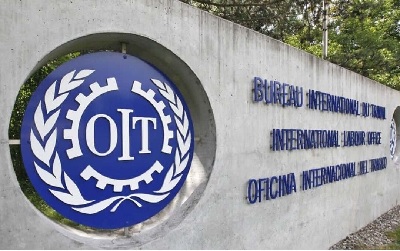
19-04-2022 | Noticias-en
 During September 2021, Law No. 21,369 was published in the Official Gazette of Chile, which regulates sexual harassment, violence and gender discrimination in the field of Higher Education. This responds to the different demonstrations that have been carried out, in recent years, in the different study houses throughout the country, in which protocols and sanctions were required in these cases.
During September 2021, Law No. 21,369 was published in the Official Gazette of Chile, which regulates sexual harassment, violence and gender discrimination in the field of Higher Education. This responds to the different demonstrations that have been carried out, in recent years, in the different study houses throughout the country, in which protocols and sanctions were required in these cases.
Article 1 of the law clearly establishes what the objective of the law is: to promote policies aimed at preventing, investigating, punishing and eradicating sexual harassment, violence and gender discrimination; protect and repair the victims; establish safe environments free of sexual harassment, violence and gender discrimination, for all people who attend higher education academic communities.
The law requires higher education institutions to have a comprehensive policy against sexual harassment, violence and gender discrimination, which must contain a prevention model and a sanction model. In addition, it is required that all the levels that make up the higher education institution participate in the drafting of said policy.
Although many universities and professional institutes have been adopting policies in case of sexual harassment, violence and discrimination, Law No. 21,369 establishes a series of requirements that the policies must contain, which will be subject to control by the authority, therefore in more than one case, it will involve modifying existing policies.
For example, in article 5 of the law, the measures that the prevention model must contain are established: diagnosis of activities that are carried out within the respective institution and may imply a risk; set of measures aimed at preventing risks; awareness and information campaigns on human rights, sexual harassment, violence and gender discrimination; training for officials and academics; incorporate content on human rights, sexual harassment, gender violence and discrimination in the curricular plans; and, include the policies in the induction processes.
Higher education institutions will have until September 15, 2022 to implement the prevention models and sanction models and, once implemented, they are given a period of 90 days -extendable for 30 days- to perfect the models. and staff orientation or training.
From the Superintendence of Higher Education they have been emphatic that they will sanction the houses of studies that do not comply with a comprehensive policy against sexual harassment, violence and discrimination, as established by law, to the point that they will not be able to obtain their accreditation. institutional.
All of the aforementioned translates into an exhaustive process that higher education institutions must carry out. The implementation of a prevention and sanction model in accordance with the requirements established in Law No. 21,369 aims to prevent, sanction and eradicate sexual harassment, violence and gender discrimination, and ensure safe environments.
This is possible to the extent that all the stages involved in this process are met, and understanding that the work does not end once the prevention and sanction models are drawn up, but that implementation, training and constant review and updating are key to to ensure the objectives established by law.
For more information you can contact:

Rodrigo Albagli | Partner Albagli-Zaliasnik | ralbagli@az.cl

Daniela Hirsch | Compliance Group Director | dhirsch@az.cl

19-04-2022 | Noticias-en
 On the occasion of the issuance of Law 2195 of 2022, or the new Transparency Law, the administrative sanctioning regime against legal persons for the commission of crimes in organizational contexts has been extended and expanded in Colombia.
On the occasion of the issuance of Law 2195 of 2022, or the new Transparency Law, the administrative sanctioning regime against legal persons for the commission of crimes in organizational contexts has been extended and expanded in Colombia.
Previously, this regime was limited to the commission of a single crime (bribery for giving or offering) by the administrators or legal representatives of a commercial company or branch of a foreign company. Currently, there has been an expansion of both the objective aspect (crimes for which administrative sanctions can proceed against legal persons), and the subjective aspect (natural persons who can trigger sanctions through their crimes and legal persons who can be punished).
In relation to the first, it went from bribery for giving or offering to include in this catalog all crimes against the public administration (although technically not all crimes of this nature can be committed by administrators of private companies), crimes against the environment (recently reformed), crimes against the economic and social order (including smuggling, customs fraud, money laundering, among others), and some crimes related to the financing of terrorism and the administration of assets related to criminal organizations. In this way, the catalog of crimes was expanded, being possible to maintain that it evolved from a “sanctioning regime for acts of corruption” to a “sanctioning regime for criminal acts”.
Regarding the latter, while before only the criminal act of an administrator or legal representative triggered the jurisdiction of the Superintendency of Companies to sanction the legal entity, now this also extends to “officials”, a problematic word that could be understood to include to any employee of the organization.
Likewise, now not only commercial companies and branches of foreign companies may be sanctioned, but also State industrial and commercial companies, non-profit entities and, anti-technically, the new law also mentions legal persons that integrate consortiums or temporary unions, which would be framed in any of the previous categories.
It should not be forgotten that all these modifications have profound effects on all companies in the country, since the sanctions that the various superintendencies or supervisory bodies may now impose for these matters are not minor: fines of up to 200,000 SMLMV plus the highest value divided by the benefit obtained or intended; inability to contract with the State on a permanent basis; prohibition to receive incentives or subsidies from the State for up to 10 years; publication of the sanction in the media for up to one year; and/or removal of administrators or employees, all of which is registered in the Chambers of Commerce.
In this way, the implementation of true compliance programs that allow the effective prevention of crimes in their organizations and that, in a sanctioning process, allow discrediting compliance with the requirements that structure this administrative responsibility, returns to the center of the needs of companies. , namely, that the company did not benefit or seek to benefit from the crime and that it did not condone or tolerate its commission.
For more information you can contact:

Oscar Tutasaura | Partner Posse Herrera Ruiz | oscar.tutasaura@phrlegal.com

19-04-2022 | Noticias-en
 On January 17, the Market Power Control Superintendence (“SCPM”) submitted the draft Organic Law on Unfair Competition (the “Draft Law”) to the National Assembly, which regulates and prohibits acts of unfair competition and proposes to convert the current SCPM into the Superintendence of Economic Competition.
On January 17, the Market Power Control Superintendence (“SCPM”) submitted the draft Organic Law on Unfair Competition (the “Draft Law”) to the National Assembly, which regulates and prohibits acts of unfair competition and proposes to convert the current SCPM into the Superintendence of Economic Competition.
It seeks to establish an autonomous protection system that regulates unfair practices, regardless of whether or not the perpetrator affects the market, different from the current regime under the Organic Law for the Regulation and Control of Market Power (“LORCPM”).
The Legislative Administration Council (“CAL”) of the Assembly has 60 days to qualify it and refer it to the respective Specialized Commission (Economic, Productive Development and Microenterprise) for processing (approval in two debates). If approved, it is not expected to take effect before the second half of 2022.
How does the current regime change?
The current regime will not change until, if applicable, a reform to the LORCPM is approved and comes into force.
The LORCPM typified some behaviors as unfair practices (acts of deception, imitation, comparison, violation of business secrets, among others) that are maintained in the Bill, but also include sales at a loss, decoy practices, pyramid selling , and covert commercial practices, as well as abuse in a situation of economic dependence (market power is not required, as indicated by the LORCPM).
Under the LORCPM, unfair practices that affect “competition, threaten economic efficiency, or the general welfare or the rights of consumers or users” were prohibited and punishable. The Bill seeks to differentiate between unfair practices that only affect individuals (which can be claimed before Civil Judges), and those that affect economic competition and general interest, called aggravated acts of unfair competition (which can be claimed before the Superintendence of Economic Competition or by civil means, and establishes penalties of 8%, 10 and up to 12% of the gross income received by the offender in the previous year).
In addition, it should be noted that the reversal of the burden of proof is contemplated, that is, the accused must prove that there is no infraction.
For more information contact:

Maria Rosa Fabara | Partner Bustamante Fabara | mrfabara@bustamantefabara.com

13-04-2022 | Noticias-en
On March 15, 2022, the Chamber of Senators ratified Convention 190 of the International Labor Organization (“ILO”) 190 on workplace violence and harassment, which aims to force employers to establish preventive and disciplinary measures to eradicate any type of physical and/or psychosocial violence that workers may suffer for the provision of their services.
The most relevant points of the Agreement are:
An inclusive approach, with a gender perspective;
Global definitions regarding violence, harassment and discrimination based on gender issues;
Control of the application of sanctions, means of prevention against acts of violence and repair of damages; y
Sensitization to the problem of workplace violence and harassment;
The Convention will be deposited with the ILO and once its general director registers it, it will enter into force the following year as a Mexican regulatory framework and must be published by decree in the Official Gazette of the Federation.
The purpose of the Agreement is to counter negative attitudes and behaviors for the free development of the person within the workplace. Companies will have to create or update their policies, protocols and mechanisms to develop a harmonious environment free of violence and harassment.
Currently, within the Mexican laws and regulations, there are already some current obligations that attend to the content of said Agreement, among which the following stand out:
The elaboration of a protocol in conjunction with the workers, for the prevention of discriminatory acts for reasons of gender, violence, harassment or sexual harassment, based on the Federal Labor Law in its article 132 section XXXI; and
The development of a policy and mechanisms for the prevention, monitoring and application of sanctions, based on the Official Mexican Standard NOM-035-STPS-2018, Psychosocial risk factors at work-Identification, analysis and prevention (“NOM035”) , which focuses on:
a) The prevention of psychosocial risk factors;
b) The prevention of workplace violence; Y
c) The promotion of a favorable organizational environment.
The Ministry of Labor and Social Welfare, through the federal labor inspection department, must ensure that said measures and obligations are applied in the work centers. In the event that the Secretariat, through the federal labor inspection directorate, finds irregularities and/or notices any type of non-compliance with respect to said provisions, it may impose fines that may vary from 50 to 5,000 UMAS for each possible non-compliance attributable to the employer, which is equivalent to an amount of $4,811.00 up to $481,100.00 pesos. It is important to note that the aforementioned amounts may increase depending on the number of breaches or omissions that can be detected.
In order to be prepared to comply with ILO Convention 190, we recommend that companies begin to observe the obligations in this same sense. We suggest starting with a list of obligations and compliances in order to determine the company’s current degree of compliance.

13-04-2022 | Noticias-en
The Minister of the Comptroller General of the Union (CGU), Wagner Rosário, participated on Wednesday, March 23, in Brasilia, in the delivery ceremony of the More Integrity Seal 2021/2022 of the Ministry of Agriculture, Livestock and Supply of Brazil.
Agribusiness companies and cooperatives were awarded for adopting integrity practices focused on social responsibility, environmental sustainability and ethics, based on the evaluation of the Seal Management Committee, which includes the participation of a CGU representative. The Map Minister, Tereza Cristina, also participated in the event along with other authorities.
The More Integrity Seal of the Ministry of Agriculture, Livestock and Supply is aligned with the Program for the Promotion of Public Integrity (Profip) of the CGU. During the event, Minister Wagner Rosário highlighted the good results of the efforts of public and private institutions, together with civil society, in favor of ethics and integrity. “Our state-owned companies, for example, are all aligned with the recommendations of the OECD Integrity Council. The state companies that seven years ago were involved in corruption scandals, harming the treasury, today show good results”, he said.
The minister also said that, in a survey carried out with the World Bank, in 2021, in alliance with the Federal Government, 22,130 public servants were interviewed, with an average experience of 16 years in the work, in all the federal units of the country and in all ministries. According to him, of these public servants, 58% said they had observed unethical acts in the federal government during their career in public service. “When we ask that, in the last three years, that number has dropped to 33%. The numbers are not good yet, but they already show that the work of public and private institutions, together with civil society, is bearing fruit”, he celebrated.
For Wagner Rosário, integrity must be associated with a rational and reasonable attitude. “This is the daily challenge in our profession, a change of mentality. With a stronger culture of integrity, we will need less control. it is a process. Patience is needed for this culture to be absorbed by all. And, as much as many people try to denigrate the image of Brazil, public and private efforts have made a difference in the country”, he concluded.
17 organizations from the agricultural sector were awarded, nine of which received the award for the first time and eight achieved renewal of the certificate. On the occasion, the “Mais Integrity Seal – Special Version” was also launched and four organizations were recognized with the delivery of the “Mais Integrity Seal Partner Association 2021/2022” trophy.
Minister Tereza Cristina highlighted the efforts of companies and cooperatives in the agricultural sector to maintain the full purpose of management, even in the face of the challenges imposed by the pandemic. According to her, this will open up markets that were previously considered unattainable. “Since we started the project, we have been fully aligned with good management practices, with social responsibility and environmental sustainability. We support companies on several fronts and we have space to promote, through our Agrointegro registry, even those that are with initial integrity actions. Today we already have almost 30 registered companies and cooperatives,” she said.
The ordinances approving the Mais Integridade Seal Brand Manual and the regulations for the next edition of the award by the Ministry of Agriculture, Livestock and Supply also took place during the ceremony.

13-04-2022 | Noticias-en
Last December 2021, the Minister of Justice of the Plurinational State of Bolivia, Iván Lima Magne, went on to state that during March 2022 the judicial reform would be carried out based on the announcement made by the president, Luis Arce Catacora, in a report to international organizations.
The minister pointed out the commitment he has with the people to carry out a judicial reform that is objective.
After the recommendations of international organizations, Minister Lima made official that the Judicial Summit will be held this year, based on the recommendations made to the Bolivian Government by the Interdisciplinary Group of Independent Experts (GIEI-Bolivia) and the Committee Against Torture ( CAT, for its acronym in English).
Likewise, Minister Lima mentioned that the diagnosis made in the departmental socialization meetings of the six axes of the reform and the guidelines established at the 2017 summit will be added to the debate.
The axes proposed by the Ministry of Justice for the reform are: conflict balancing (uniform and strategic distribution of judges in the country), access to justice, judicial independence, information and communication technologies, regulatory development and institutional transparency .













